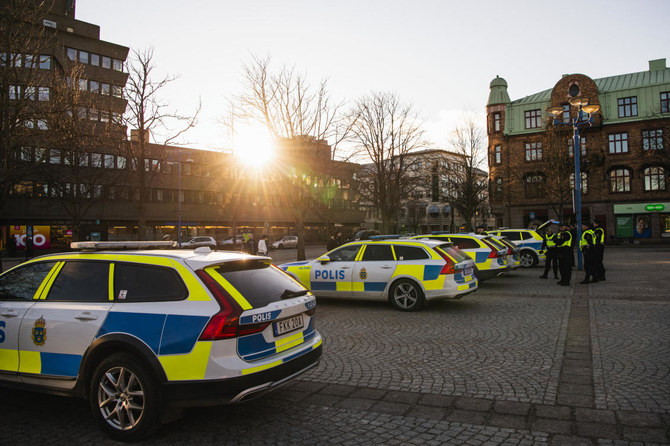JAKARTA: Indonesia’s netizens may soon have to apply for a license before live streaming content.
This will happen if the country’s Constitutional Court approves a judicial review motion challenging an article in the 2002 Broadcast Law, officials told Arab News on Saturday.
During the last hearing for the motion on Aug. 27, Indonesia’s Communications and Informatics Ministry official, Ahmad M. Ramli, said that if the Constitutional Court approves the review, social media users will not be able to use features such as Facebook Live, Instagram TV or Live, YouTube Live and other live streaming applications to air video content.
“It means, that we must shut down their operations if they do not apply for the permit,” Ramli said, adding that the obligation will also cover individuals as well as business entities.
The motion was filed in June by private broadcasters RCTI and iNews, subsidiaries of MNC Group, one of the country’s largest media groups — owned by businessman-turned-politician, Hary Tanoesoedibjo — with the next hearing scheduled for Sept. 14.
The petition seeks to expand the definition of broadcasting activities to cover live streaming services provided by all Internet-based platforms, including YouTube, Instagram and Facebook.
According to a court filing, the plaintiffs argue that they had suffered constitutional losses due to “unequal treatment” toward conventional broadcasters and Internet-based audiovisual platforms.
In a written statement obtained by Arab News on Friday, MNC Group corporate legal director, Christophorus Taufik, said that the company wants to “fulfill its constitutional obligation and create a level-playing field for Indonesian digital content creators with their global peers” through the review.
An expansion of the broadcasting activities’ definition will oblige the platforms to obtain an official license, issued by the ministry.
The move immediately caused a stir in the country, which has seen robust growth in the number of Internet users over the past few years, mainly due to a spike in smartphone ownership.
A study released by Hootsuite and Daily Social in January this year said that the number of Indonesian Internet users had increased to 175.4 million last year, up from 17 percent in 2018, out of a total population of 272.1 million.
The same report stated that there were 160 million social media users in 2019, an 8.1 percent increase from the previous year, adding that these netizens spend an average of three hours 26 minutes on social media every day, nearly an hour more than the global average.
Currently, content posted by Indonesian social media users must adhere to the Electronic Information and Transaction (ITE) Law, which makes criminal defamation, hate speech and inciting violence illegal.
Concerns, however, are now being raised that the ongoing judicial review against the Broadcast Law would “strain the rights to free speech” enjoyed by Indonesians and become a “new threat to democracy.”
“The review could also lead to the establishment of a new watchdog agency to filter Internet-based live streaming content,” Yerry Borang, Indonesia content, training and project officer at digital rights NGO Engage Media, told Arab News.
He added that the effectiveness of Indonesia’s broadcast monitoring mechanism was “already questionable.”
“It will also be too arduous to oversee all Internet-based broadcasts and issue license for everyone who wants to use live streaming services,” Borang said.
West Java-based artist and communication lecturer, Sandi Jaya Saputra, agrees and said that the MNC Group had gone “overboard” with the proposal.
Saputra, who hosts a talk show about Indonesia’s visual arts movement on his Instagram account regularly, said that the live stream feature offered by social media platforms “allows him to share knowledge and provide the public with more options to access information.”
“The review filed by MNC Group indicated an intention to muffle our freedom of expression and speech,” he told Arab News.
Meanwhile, MNC’s Taufik denied the allegations that the company wanted to suppress the creativity of Indonesia’s digital content creators, adding that the MNC was “pushing to synchronize” the outdated Broadcast Law with more up-to-date rules such as the Telecommunication and ITE laws.
There are, however, more pressing issues to be addressed when pursuing a revision to the Broadcast Law, Muhamad Heychael, a communication lecturer and activist with the National Broadcast Reform Coalition (KNRP), told Arab News.
“The move to amend the law had actually begun in 2009 with a focus on, among other things, decentralizing Indonesian broadcasting activities and putting an end to media oligopoly,” he said.
The focus on regulating the operations of social media platforms in Indonesia, he added, should be directed toward main business and economic aspects such as “imposing a mutually beneficial taxation scheme and ensuring that all contents posted on the platforms do not incite hatred or violence.”
“We still have no idea of how the licensing procedure will take effect, will it affect Internet companies or their users. If the review is approved and the definition of broadcasting activities is expanded, it will restrain efforts to realize President Joko Widodo’s ambition to gain benefit from the Industry 4.0 to develop the country’s economy,” he said.


























